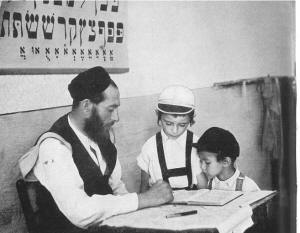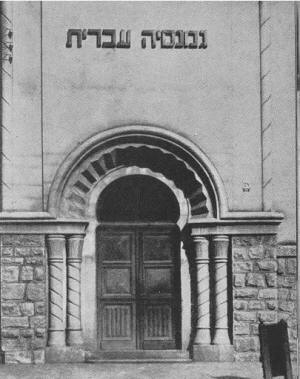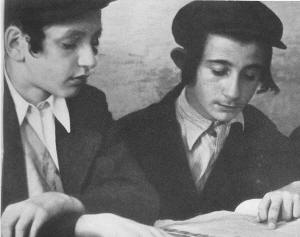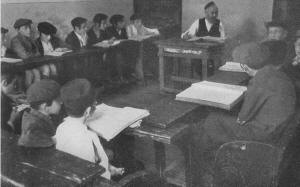Previous
UNDER
THE CARPATHIANS
HOME OF A FORGOTTEN PEOPLE
A Dynasty of Rabbis
Next
Previous | UNDER THE CARPATHIANS HOME OF A FORGOTTEN PEOPLE
A Dynasty of Rabbis
| Next
|
 The double setback which Mukacevo sustained when it lost its position as the country’s Episcopal see and potential capital was somewhat mitigated in that it still remained the centre of Jewish faith. Jewish boys from far and near flocked to the religious school at Mukacevo to study the intricate precepts and tenets of the Talmud. This school was held in high esteem by the Jewish communities of Eastern Europe. Only specially selected students, enrolled by their fathers as soon as they were born, were admitted. Many were sons of rabbis or other distinguished persons, and gifted students had the chance of being appointed to important posts as religious teachers anywhere in the world.
The double setback which Mukacevo sustained when it lost its position as the country’s Episcopal see and potential capital was somewhat mitigated in that it still remained the centre of Jewish faith. Jewish boys from far and near flocked to the religious school at Mukacevo to study the intricate precepts and tenets of the Talmud. This school was held in high esteem by the Jewish communities of Eastern Europe. Only specially selected students, enrolled by their fathers as soon as they were born, were admitted. Many were sons of rabbis or other distinguished persons, and gifted students had the chance of being appointed to important posts as religious teachers anywhere in the world.
 The reason why this school enjoyed such a high reputation among the Jews was that its head was a rabbi to whom superior wisdom and supernatural powers were attributed by his devoted followers. The Rabbi of Mukacevo was much more than an ordinary religious teacher ; he was, in fact, an intermediary between his community and God. The prayer of the average believer was considered insufficient to reach the ear of the Supreme Being and the intercession of the wise rabbi -the Zaddik - was essential. He was the adviser of his people, and his advice was God’s guidance, his words proclaimed the Truth.
The reason why this school enjoyed such a high reputation among the Jews was that its head was a rabbi to whom superior wisdom and supernatural powers were attributed by his devoted followers. The Rabbi of Mukacevo was much more than an ordinary religious teacher ; he was, in fact, an intermediary between his community and God. The prayer of the average believer was considered insufficient to reach the ear of the Supreme Being and the intercession of the wise rabbi -the Zaddik - was essential. He was the adviser of his people, and his advice was God’s guidance, his words proclaimed the Truth.
The veneration accorded to him by devout Jews was astonishing. whenever it became known that he was going to travel anywhere, thousands of orthodox Jews flocked to the railway stations where the train was due to stop and everyone tried to touch his kaftan, or, better still, his skin. It was a great privilege to eat at his table, and only few could boast of such a favour. He was very wealthy, for gifts were showered on him by his admirers from all over the world money, gold and jewels by the rich, and more humble offerings, often in kind, by the less-well-off. This adviser, teacher, prophet and priest of his people had the status of a prince and was accompanied by a stately retinue on his journeys.
 The office of Master Rabbi was held by the same family for several generations. It was customary to propose the rabbi’s son as his successor and, unless there were strong reasons against his appointment, he was usually elected. If the rabbi had no son, he tried to find a promising young rabbi as a husband for his daughter.
The office of Master Rabbi was held by the same family for several generations. It was customary to propose the rabbi’s son as his successor and, unless there were strong reasons against his appointment, he was usually elected. If the rabbi had no son, he tried to find a promising young rabbi as a husband for his daughter.
This is what happened in Mukacevo a few years before the war The last male representative of the Spira rabbinic family arranged for the marriage of his daughter to the son of a Polish Master Rabbi. This was a great event for Jewry, for it did not often happen that the children of two Zaiddiks were married. On this momentous occasion hosts of faithful Jews made a pilgrimage to the humble little town under the slopes of the Carpathians to attend the ceremony. Many special trains, tightly packed with excited visitors, had to be run ; the postal service was strained to breaking point, and during the festivities which lasted no less than a fortnight it was next to impossible to find sleeping accommodation for the vast multitude. Smartly dressed Jews from Brooklyn, Rio de Janeiro, Golders Green and elsewhere rubbed shoulders with their bearded fellow-believers in shabby kaftans from the East, all eager to catch a glimpse of the Holy Man in his white satin robe.
 The time was near at hand when the Jews of Eastern Europe were to be engulfed by the tide of savage persecution. In those days of sinister forebodings and anxiety the Carpathian Jews were looking up to their spiritual leader and prophet for guidance and advice. The. wise man counseled patience and faith in Providence. The Lord might inflict new trials and sufferings upon the children of Israel, but they would rise again from their tribulation as they had SO often done in the past.
The time was near at hand when the Jews of Eastern Europe were to be engulfed by the tide of savage persecution. In those days of sinister forebodings and anxiety the Carpathian Jews were looking up to their spiritual leader and prophet for guidance and advice. The. wise man counseled patience and faith in Providence. The Lord might inflict new trials and sufferings upon the children of Israel, but they would rise again from their tribulation as they had SO often done in the past.
Must of his flock followed his advice there was little else they could do and remained where they were. Their rabbi stayed with them. The ordeal which they had to endure was far more horrible and disastrous than the wise rabbi had foreseen. Many paid the supreme penalty and few were allowed to remain where they had been born. The rabbi himself was sent to a concentration camp from which he was saved only by the unwavering loyalty of his friends overseas, who paid a high ransom for his release and enabled him to get to Palestine.
Thus ended the reign of a remarkable dynasty of rabbis under the Carpathians, and Mukacevo lost its third claim to eminence in the country’s affairs.